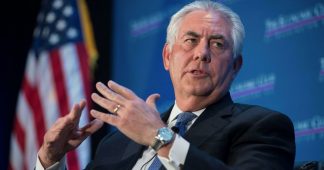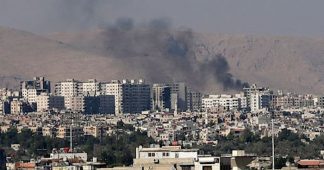Syria’s alleged gas attack: An imperialist provocation
The Trump administration publicly responded to unsubstantiated allegations that forces loyal to the government of President Bashar al-Assad bore responsibility for a chemical attack in Syria’s northwestern Idlib province with the threat of a new escalation of the American intervention in the war-ravaged Middle Eastern country.
Speaking alongside one of Washington’s favorite Arab puppet rulers, Jordan’s King Abdullah II, during a joint news conference at the White House, Trump declared that the “heinous actions by the Assad regime cannot be tolerated” and had “crossed a lot of lines for me.” While condemning his predecessor, Barack Obama, for failing to carry through on a threat to intervene militarily in Syria over alleged chemical weapons attacks in 2013, Trump declared “I now have the responsibility,” adding that his “attitude toward Syria and Assad has changed very much.”
Washington’s ambassador to the United Nations Nikki Haley, meanwhile, issued an even more direct threat of unilateral US military action in the run-up to an anticipated Russian veto of a provocative Western-backed resolution that could serve as a fig leaf for aggression against Syria. “When the United Nations consistently fails in its duty to act collectively, there are times in the life of states that we are compelled to take our own action,” she said.
Fourteen years after the US invaded Iraq, turning that country and much of the Middle East into a charnel house, Washington is at it again, employing a strikingly similar pretext for imperialist aggression.
Once again, the US and world public is being bombarded with unsubstantiated claims about “weapons of mass destruction” allegedly employed by an oppressed former colonial country, mixed with crocodile tears and feigned moral outrage from a government responsible for more civilian deaths and war crimes than any regime since the fall of the Nazi Third Reich.
The pretext for this orchestrated campaign has all the earmarks of an imperialist provocation planned and executed by the Central Intelligence Agency and allied Western secret services with the aim of shifting US policy in relation to Syria.
First, there is the question of motive. Who benefits from such a crime? Clearly, it is not the Assad regime, which, with the aid of Russia and Iran, has largely vanquished the Islamist “rebels” that were armed, financed and trained by the CIA and Washington’s regional allies in the bloody six-year-long war for regime change. The government now rules over 80 percent of the country, including all of its major cities, with the Islamists’ hold reduced to largely rural areas of Idlib province. Under conditions in which the Trump administration had been signaling a shift in focus from toppling Assad to fighting the Islamic State of Iraq and Syria (ISIS), why would Damascus carry out such a provocative attack?
The CIA-backed “rebels” themselves, however—along with their patrons in the US military and intelligence apparatus—have every interest in staging such a provocation as a means of thwarting the government’s consolidation of its rule throughout Syria. Moreover, numerous investigations, including by the UN’s own chemical disarmament agency, have made it clear that these forces, dominated by the Syrian Al Qaeda affiliate, the Al Nusra Front, have carried out similar attacks using both chlorine and sarin gas, which they have received from their regional backers in Saudi Arabia, Qatar and Turkey and which they themselves have proven capable of manufacturing.
Then there is the issue of timing. The alleged gas attack was launched Tuesday morning, coinciding with the opening in Brussels of a European Union-sponsored “Conference on Supporting the Future of Syria and the Region,” which was to review proposals for “political transition” in Syria as well as Europe’s intervention in the potentially lucrative reconstruction of the ravaged country. The alleged chemical attack set the stage for renewed demands for regime change and criticism of the Trump administration for suggesting that the ouster of Assad was no longer a priority.
There is a definite pattern here. The last time that Washington and its allies accused the Assad regime of a major chemical weapons attack and nearly launched a full-scale war on that pretext was in August 2013. That alleged attack, which subsequent revelations exposed as a “rebel” provocation carried out with the help of Turkish intelligence, was launched on the very day that UN weapons inspectors arrived in Damascus.
The most telling aspect of the entire affair, however, is the extraordinary coordination of the entire corporate media in the launching of a full-throated campaign for military action before the basic facts of the incident were even known, much less a serious investigation conducted. It seemed that even before the alleged incident in Syria was reported, all of the major newspaper editors and columnists as well as the television news commentators had received the same talking points.
None of them, of course, bothered to inform their readers and viewers that the sole sources of the information they retailed as good coin consisted of Al Qaeda-connected “activists” in Syria along with US intelligence and military officials pushing for war.
Leading the pack, as usual, was the New York Times, which carried the headline “Chemical Attack on Syrians Ignites World’s Outrage.” What evidence there is of such “outrage,” outside of the world of intelligence agencies, state officials and their media hacks was not clear. Nor, for that matter, was there any explanation for the selective character of this “outrage.”
It is noteworthy that this moral outpouring came just a day after Trump gave the red carpet treatment to Gen. Abdel Fattah el-Sisi, the butcher of Cairo, who slaughtered 1,000 unarmed demonstrators in a single day. Nor, for that matter, did the Times evince any such “outrage” over the 200 Iraqi civilians killed in a single US bombing raid in Mosul last month, or the hundreds if not thousands more buried alive by US bombs and missiles dropped on schools, mosques and homes in Syria itself, not to mention in Yemen.
There are certain bylines that appear on such articles that brand them as the product of direct collaboration with US intelligence. In this case, it was that of Anne Barnard, who has provided such services over the entire course of the US-orchestrated war for regime change in Syria. Her work was supplemented by that of Thomas Friedman, who has backed every US imperialist intervention over the course of over a quarter century. He offers a modest proposal for the “partition of Syria” and the creation of “protected” zones enforced by the US military. “It won’t be pretty or easy,” he allows, noting reassuringly that the US maintained 400,000 troops in Europe during the Cold War.
What is also strikingly uniform in the media propaganda campaign over the events in Syria is the across-the-board indictment of Iran and Russia as equally culpable in the alleged chemical attack. The Times editorial charged that the attack speaks to Assad’s “depravity and that of his enablers, especially Russia and Iran.”
A Washington Post editorial insisted: “Now it is Mr. Trump’s turn to decide whether to stand up to Mr. Assad and his Iranian and Russian sponsors.”
The aim is clear. The murky events in Syria are to be exploited in order to shift the bitter internal debate on foreign policy within the US ruling establishment. The intention is to bring the Trump administration into line with the predominant tendency within the US military and intelligence apparatus which is pushing for an uninterrupted buildup to military confrontation with both Iran and Russia.
That these efforts are having their desired effect found concrete expression Wednesday not only in Trump’s remarks on Syria, but also in the removal of Stephen Bannon, Trump’s fascistic chief strategist, from the principals committee of the National Security Council. The ouster of the ideological architect of Trump’s “America first” right-wing nationalist demagogy was reportedly dictated by Gen. H.R. McMaster, the president’s new national security adviser, an active duty officer who speaks for the Pentagon. Faced with intractable social and political crises at home, Trump, like his predecessors, appears to be turning toward war abroad.
The working class in both the US and internationally must take these developments, along with the CIA provocation in Syria and its accompanying media propaganda campaign, as a deadly serious warning. It faces the threat of being dragged not only into a renewed bloodbath in the Middle East, but a far more dangerous conflagration involving the world’s two major nuclear powers.
Bill Van Auken











